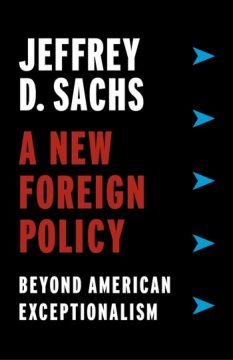Andy Fitch in the Los Angeles Review of Books:
 ANDY FITCH: A New Foreign Policy takes the sustainable-development framework (prioritizing smart-infrastructure investments, significantly expanded renewable-energy production, more equitable income distribution, tech-fostering education) that you have outlined for various domestic contexts, and applies this to a broader international arena. Could you introduce that sustainable-development approach here by sketching how its basic principles might overlap whether one adopts a domestic- or global-policy vantage — and also by pointing to where this new book might need to provide a slightly different emphasis, argument, agenda? Specifically picking up this book’s subtitle, could you start to sketch how the follies of American-exceptionalist approaches (both at present, and amid a longer arc of US history) might contribute both to the necessity and to the difficulty of adopting this sustainable-development model as a guiding frame for today’s foreign policy?
ANDY FITCH: A New Foreign Policy takes the sustainable-development framework (prioritizing smart-infrastructure investments, significantly expanded renewable-energy production, more equitable income distribution, tech-fostering education) that you have outlined for various domestic contexts, and applies this to a broader international arena. Could you introduce that sustainable-development approach here by sketching how its basic principles might overlap whether one adopts a domestic- or global-policy vantage — and also by pointing to where this new book might need to provide a slightly different emphasis, argument, agenda? Specifically picking up this book’s subtitle, could you start to sketch how the follies of American-exceptionalist approaches (both at present, and amid a longer arc of US history) might contribute both to the necessity and to the difficulty of adopting this sustainable-development model as a guiding frame for today’s foreign policy?
JEFFREY D. SACHS: Sustainable development applies to each individual country, and also applies globally. In our economic, social, and political life, it aims for prosperous, fair, and environmentally minded societies. Within a United Nations context, most of the world already has accepted these basic principles — dating back to the 1992 Earth Summit in Rio, and then with the Sustainable Development Goals in 2015, and the Paris Climate Agreement in 2015. Of course we haven’t yet fulfilled those goals within our own country, much less globally. So this book (and my writing more generally in recent years) emphasizes the danger we have put ourselves in by not heading in a more sustainable direction. In fact, we seem to have displayed a collective tendency to head away from these goals, towards increased inequality and self-destructive habits ruining the planet.
More here.
